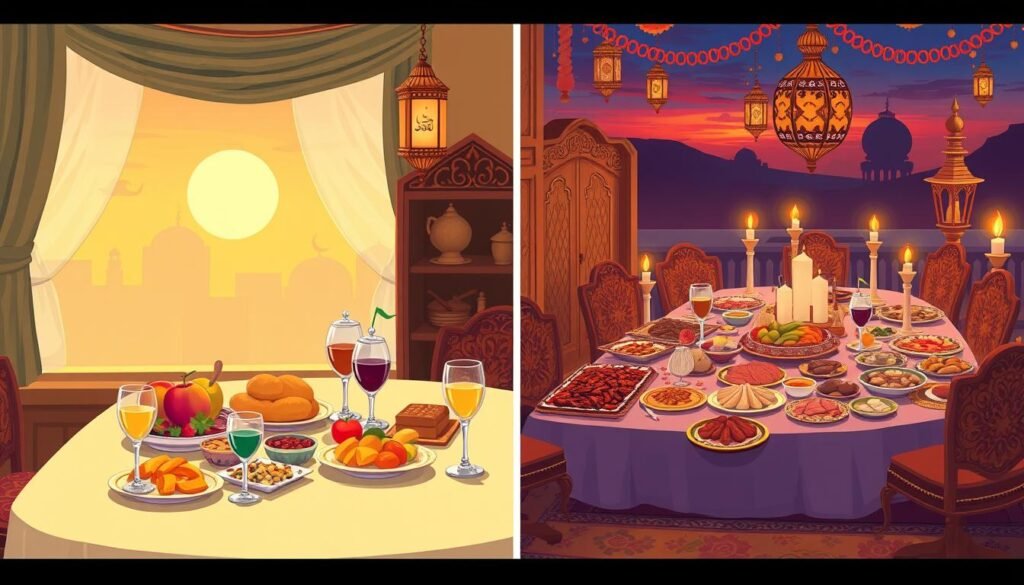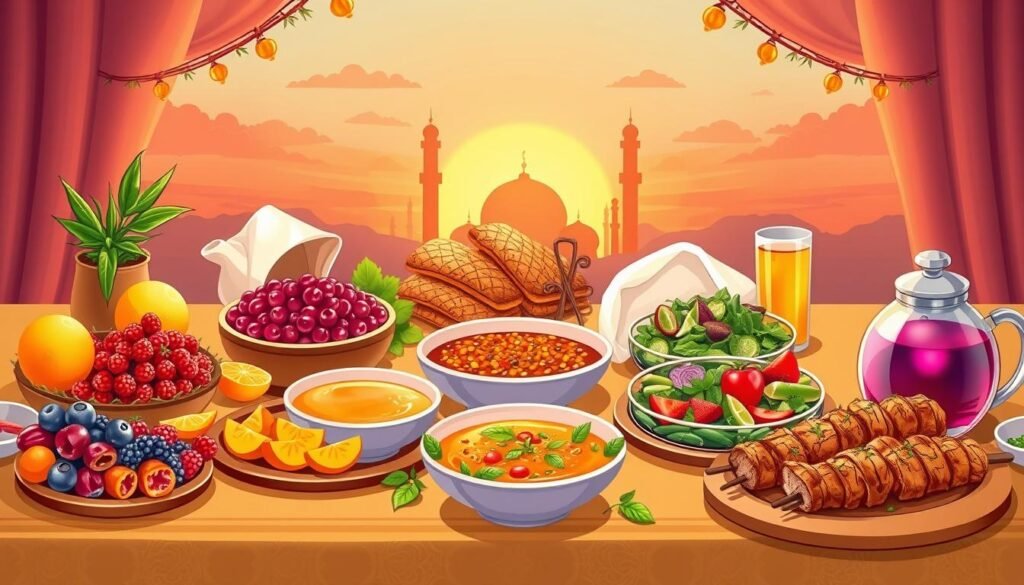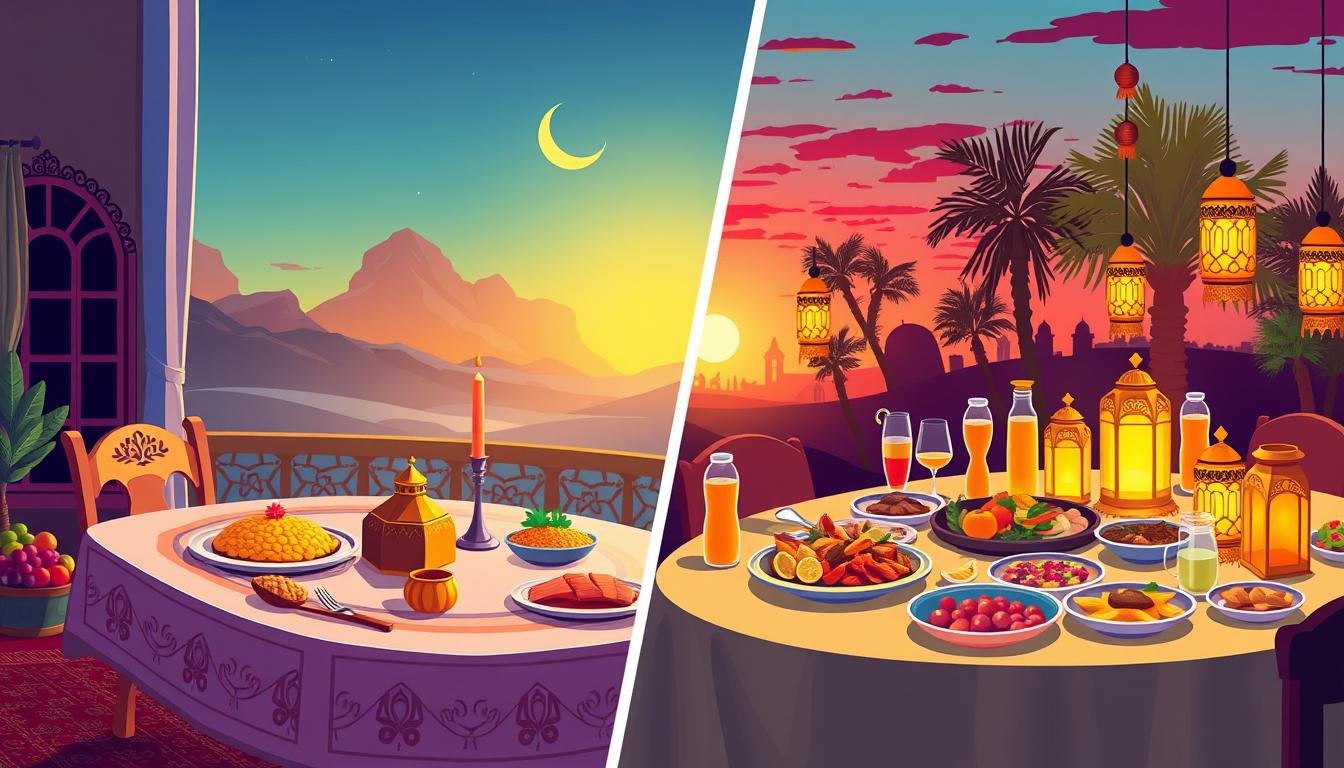Have you ever wondered how Muslims fast from dawn till sunset in Ramadan? This holy month, from March 10 to April 9, 2024, has strict fasting rules. Meals at specific times are very important.
The pre-dawn meal is called Suhoor, and the evening meal is Iftar. These meals show the discipline and community bond of Muslims.
During Ramadan, Muslims don’t eat, drink, or do certain activities during the day. The fasting times start around 5:46 a.m. and end at 6:48 p.m. in 2024. This practice helps with spiritual growth and self-reflection.
For many, the meal times can change based on how they interpret the rules and where they live.
Understanding Ramadan and Its Significance
Ramadan is the ninth month of the Islamic calendar. It’s a time of deep spiritual meaning for Muslims worldwide. The significance of Ramadan goes beyond just fasting from dawn to sunset. It’s a month for spiritual growth and reflection.
This month is when the first Quran verses were revealed. It makes people feel a strong urge to focus on their spiritual lives. Many try to read the whole Quran during Ramadan, showing its importance.
Fasting, or Sawm, has many spiritual benefits. It helps people become more God-conscious and think about their actions. It also makes them appreciate what they have more.
People stop eating, drinking, and doing physical things during the day. This lasts for 29-30 days. It’s a big commitment.
Ramadan’s timing changes every year because of the Islamic calendar. This means each Ramadan is different. People pray more, read the Quran, and give to charity during this time.
This period is a big part of a Muslim’s spiritual journey. It brings the community together.
Fasting Rules During Ramadan
Fasting in Ramadan is a key part of Islam. It involves not eating or drinking from dawn to dusk for 30 days. This helps Muslims grow spiritually and learn self-control.
Adults who are healthy must fast during Ramadan. But, some people don’t have to fast. This includes kids, the elderly, and those who are sick or pregnant. It shows Islam cares about everyone’s situation.
The day starts with a meal called suhur before dawn. It ends with iftar, the meal after sunset. This brings people together, making them feel more connected. It also helps them understand the struggles of others.
What Time Can Muslims Eat During Ramadan
During Ramadan, Muslims fast from dawn to sunset. They eat before dawn and after sunset. Knowing about Suhoor and Iftar helps understand Ramadan meal times.
Pre-Dawn Meal: Suhoor
Suhoor is eaten before dawn starts. Muslims wake up early for this meal. They eat foods like proteins, fruits, and whole grains to stay energized.
This meal is more than just food. It’s a time for families to come together. They share Suhoor, showing the importance of community.
Breaking the Fast: Iftar
Iftar happens right after sunset. It starts with dates and water, following Prophet Mohammed’s advice. Then, families and friends have a big meal together.
They celebrate the end of the fast with many dishes. From Egyptian Mahshi to Malaysian Murtabak, the choices vary. Iftar is a time for food, connection, and gratitude.

Typical Ramadan Daily Schedule
The Ramadan daily routine starts with a pre-dawn meal called Suhoor. This meal is key for energy and hydration. In places like San Francisco, fasting begins around 4:30 am. Muslims eat a balanced meal to last the 16 hours of fasting.
After Suhoor, the day includes morning prayers and daily activities. As the day goes on, dehydration can cause headaches and tiredness. It’s important to stay hydrated, avoiding drinks like tea and coffee.
As sunset comes, Muslims prepare for Iftar, breaking their fast. This happens around 8:30 pm. They start with dates and water, then eat a big meal to replace lost fluids and nutrients. The evening includes communal prayers, focusing on Ramadan’s spiritual side.
Hydration and nutrition are key during the schedule for fasting. This balance helps maintain well-being during Ramadan. It makes the month meaningful, filled with work, spiritual practices, and community.
Health Benefits of Fasting During Ramadan
Fasting in Ramadan is more than just not eating or drinking. It’s a deep spiritual journey. It brings health benefits that improve both body and soul. This sacred month helps people change their eating habits and connect more with their faith.
Spiritual Growth and Reflection
Fasting helps with self-control and being mindful of what we eat. It makes us think about our goals and increases our faith. When we fast, our body gets a break, and we feel less hungry.
This helps us manage our health and grow spiritually. Fasting also makes our metabolism better by lowering cholesterol. It cleanses our body and boosts our brain, improving memory and mood.
Foods to Eat During Suhoor and Iftar
Choosing healthy Ramadan foods is key to staying energized during fasting. Suhoor is a pre-dawn meal that gets us ready for the day. Foods rich in fiber, protein, and healthy fats help us stay full longer.
Suhoor meal ideas include oatmeal with nuts, whole grain bread with avocado, and yogurt with fruits. These foods give us energy and prevent low blood sugar.

At Iftar, it’s important to eat foods that are both nourishing and hydrating. Dates are often eaten first to break the fast. Then, soup helps with digestion.
Grilled, boiled, or steamed meat, chicken, or vegetables make a good main course. Adding fresh fruits helps with hydration and gives us important vitamins. It’s best to avoid processed foods and caffeinated drinks to stay hydrated.
It’s important to balance what we eat during Ramadan. Eating dried fruits like dates, walnuts, and almonds helps keep us energized. The Healthy Ramadan Guide is a great resource. It offers meal plans, recipes, and grocery lists to help us eat well during Ramadan.
Challenges of Fasting During Ramadan
Fasting in Ramadan comes with many challenges. This holy month is for spiritual growth and reflection. But, the physical and mental demands can be tough.
Physical and Mental Fatigue
Fasting in Ramadan often leads to feeling very tired. Millions of Muslims fast, and many get very tired because they don’t eat or drink during the day. This makes it hard to do daily tasks and stay productive.
Feeling mentally tired is also common. This is because of not enough sleep and changes in diet. People who work or study have to find ways to keep up with their tasks while feeling tired.
Hydration Issues
Drinking enough water is a big challenge in Ramadan. In hot places or where days are longer, it’s hard to drink enough water. It’s important to drink water many times at night, not too much at once.
Choosing the right foods for suhoor can help. Foods that help you stay hydrated are good. Keeping hydrated is key for staying healthy and focused all month.
Cultural Variations in Ramadan Practices
Ramadan is a month of fasting and thinking deeply. It shows how rich and varied the Muslim world is. Different places have their own ways of fasting and eating, showing their unique foods and cultures.
Many people start their fast with dates and water. This is because of the Prophet Muhammad’s teachings.
Iftar, the evening meal, is a time of joy. In the Middle East, it includes dishes like lamb stew and kebabs. There are also sweet treats like baklava.
In America, Muslims have started interfaith iftar dinners. These dinners bring people from different faiths together. They share food and build community ties.
As Ramadan goes on, praying together becomes more important. Mosques and community centers host these events. They help people feel united and empathetic.
In places like Norway or Sweden, fasting hours change because of the long days. This shows how Islamic law is flexible. It allows fasting to fit local conditions.
Celebrating Eid al-Fitr at the End of Ramadan
Eid al-Fitr is a time of joy, marking the end of Ramadan. During Ramadan, Muslims fast, give to charity, and reflect spiritually. The festival starts with the new moon, beginning Shawwal, the 10th month of the Islamic calendar.
People gather for special prayers at mosques or open fields. This shows unity and thanks for the month of Ramadan. It’s a time to strengthen personal and community bonds.
Charity and family are key during Eid al-Fitr. Muslims give Zakat-ul-Fitr to help those in need. This lets everyone join in the celebration.
After fasting for a month, families come together for big meals. They enjoy dishes like sheer khurma, biryani, and meat curries. Sweets are also a big hit, making everyone happy.
Children also get money or gifts from their elders. This adds to the joy and sense of community. Eid al-Fitr brings families together and promotes sharing and kindness.
FAQ
What is Suhoor and when should it be eaten?
What is Iftar and what is its significance?
Are there specific foods recommended for Suhoor and Iftar?
Can everyone fast during Ramadan?
What are some of the health benefits associated with fasting during Ramadan?
How can one manage challenges faced while fasting during Ramadan?
How do cultural variations impact Ramadan practices?
What is Eid al-Fitr and how is it celebrated?

Embracing Faith, One Insight at a Time!
The teachings of the Quran have always guided my path. With a deep passion for Islamic knowledge, I strive to blend the wisdom of tradition with the relevance of today, making the timeless messages of Islam accessible and meaningful for everyone.
Muslim Culture Hub is my platform to share historical insights and thought-provoking articles, exploring both well-known and lesser-discussed aspects of Islamic culture and beliefs. My mission is to create an inclusive online space where everyone can learn, strengthen their faith, and connect with the profound message of Islam.
Join the journey!
May peace be upon you.








